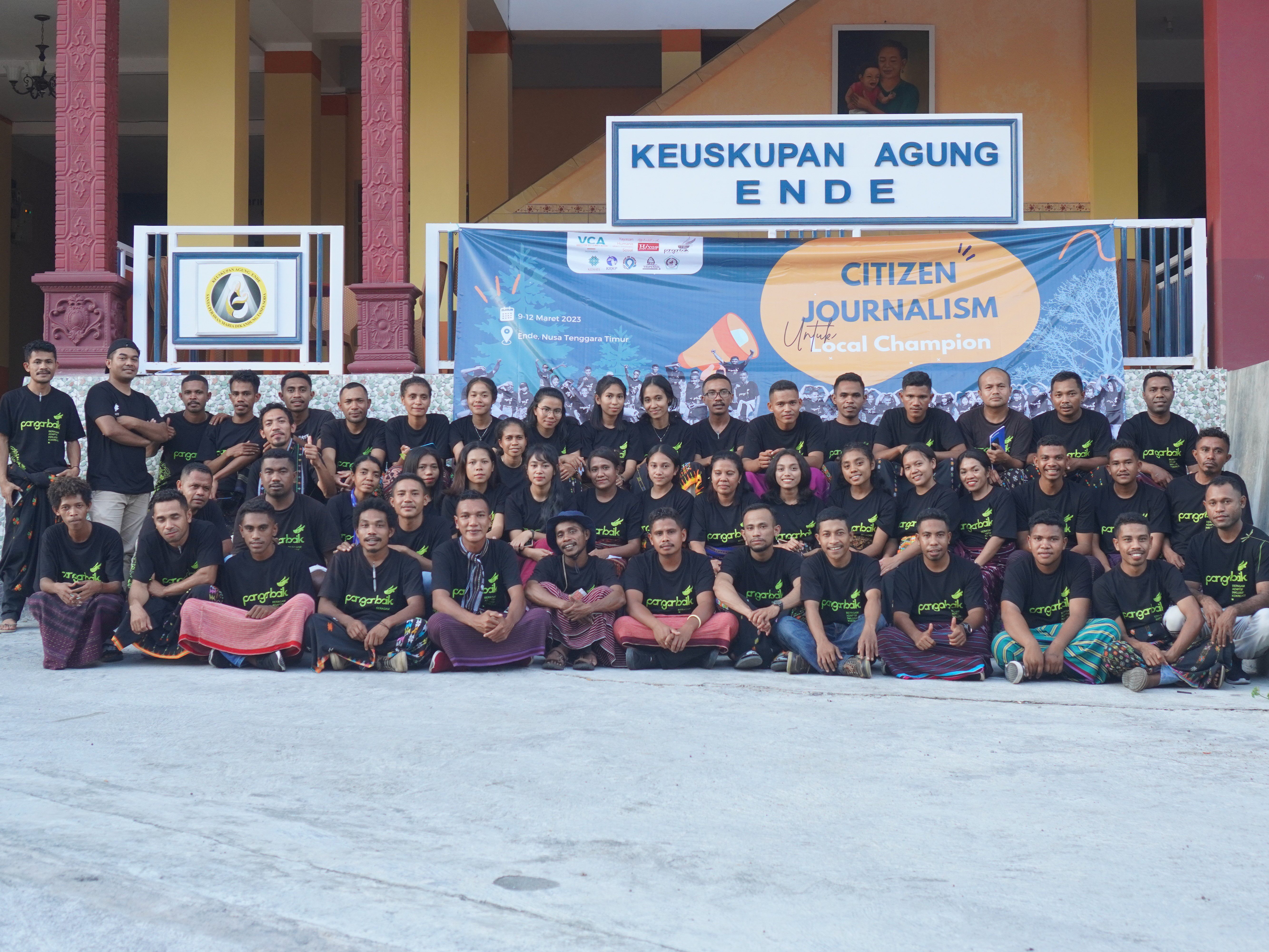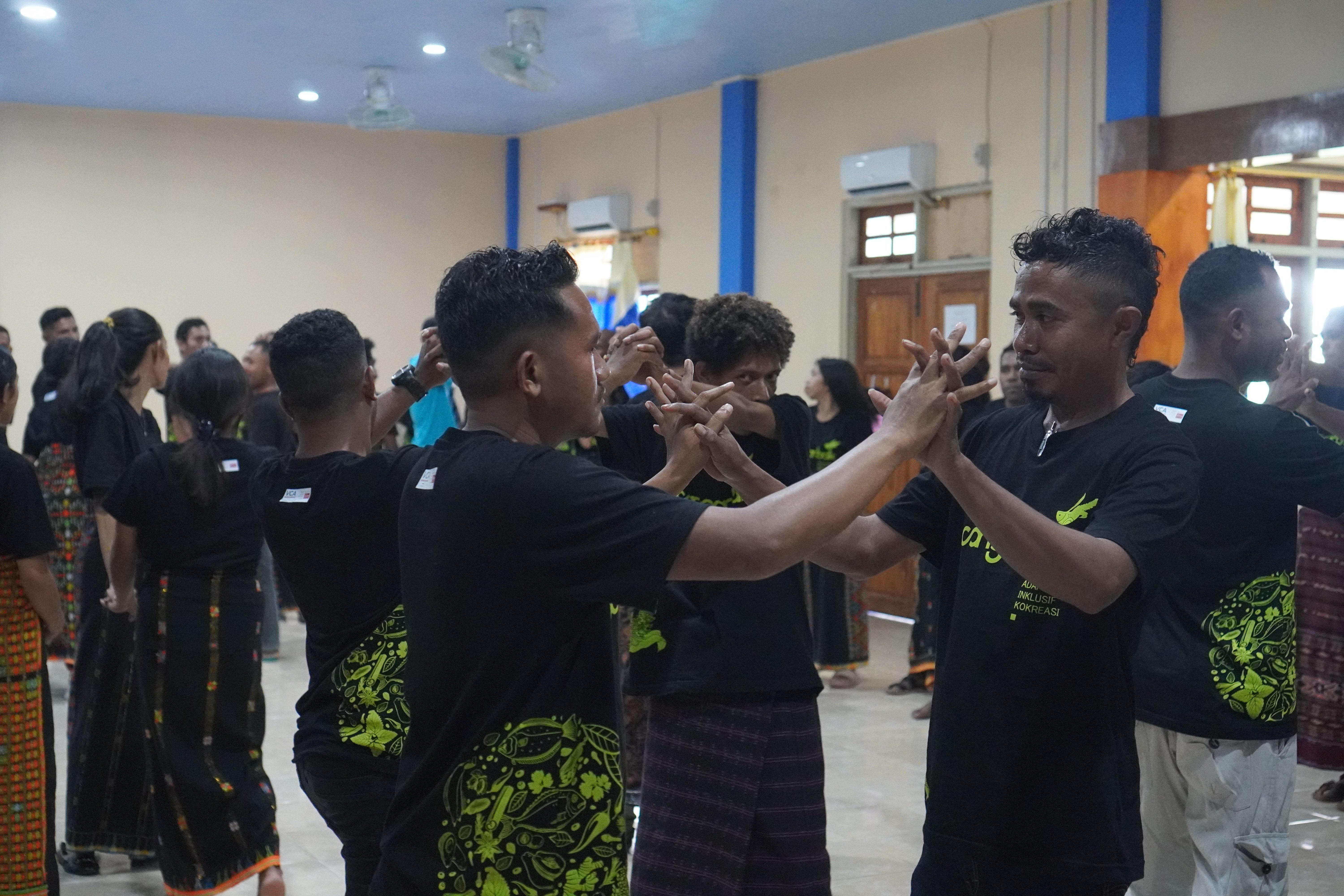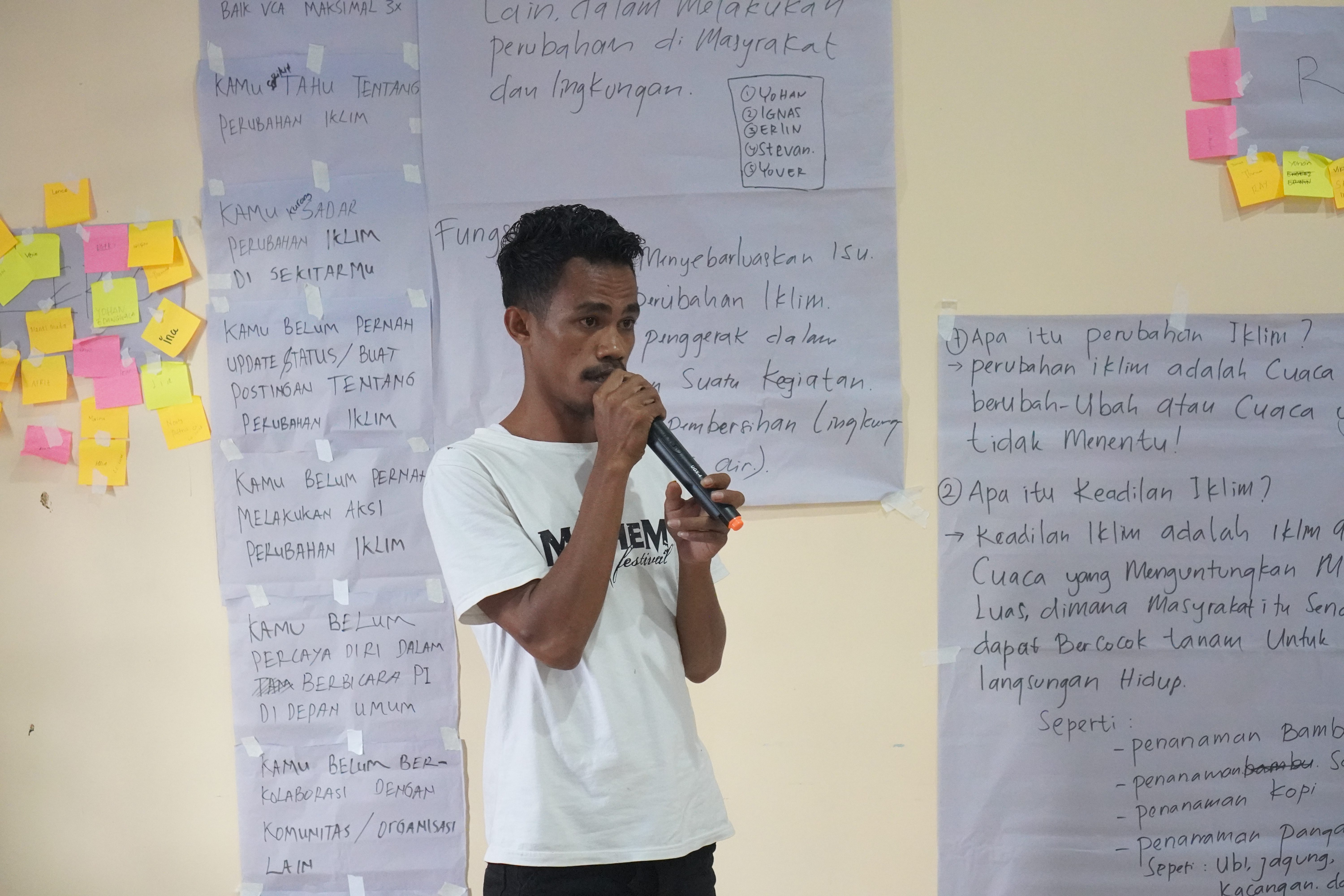CITIZENS JOURNALISM: NTT YOUNG PEOPLE CALL FOR CLIMATE JUSTICE

Pelatihan jurnalisme warga bagi anak muda NTT di Rumah Bina Kerahiman Ilahi, Kota Ende, Kabupaten Ende, Nusa Tenggara Timur. Mereka datang dari sejumlah desa di 4 Kabupaten yaitu Lembata, Flores Timur, Manggarai Timur dan Manggarai. (Foto : KEHATI)
-
Date:
27 Mar 2023 -
Author:
KEHATI
The Indonesian archipelago of East Nusa Tenggara is most impacted by climate change. Although some locations get enough rain, the majority of other areas are rather dry. Meanwhile, the lack of food security in many places renders the impoverished even more helpless.
Dozens of young people in East Nusa Tenggara started developing their talents as citizen journalists in order to highlight the issues with climate change impacts on agriculture and food sovereignty. The BAIK Food Coalition hosted the “Voice for Climate Justice” course as part of the Voices for Just Climate Action (VCA) program on March 9–11, 2023.
52 young people in all participated in a citizen journalism training session at the Rumah Bina Kerahiman Ilahi in Ende City, Ende Regency, East Nusa Tenggara. These youths are from various villages spread throughout four districts, including Lembata, East Flores, East Manggarai, and Manggarai.
Imroatul Mukhlishoh, assistant for the KEHATI Foundation Agricultural Ecosystem Program, stated at the same time that KEHATI’s role as chair of the BAIK Food Coalition includes monitoring evaluations to make sure the program is being carried out in accordance with its mission. Imroatul stated, “The objective is to strengthen and support young people and women to become leaders in developing inclusive and just climate change policies and programs, as a method to improve people’s welfare, particularly in the food and agriculture sectors.”

Bermain bersama dalam pelatihan untuk menjalin keakraban antar anak muda dari berbagai daerah (Foto : KEHATI)
With a thorough grasp of climate justice, the participants started showing up to training sessions. They had the chance to consider how climate change was affecting each area and contrast it with the phenomena of global climate change.
The BAIK Food Coalition worked with several young journalists from NTT on this program, including Hengky Ola Sura and Ijas Hagus from Ekorantt.com, Sandi Hayon from Kompas.com, and Chitos Natun, a journalist for Kompas TV covering the Flores Lembata region. The participants received training from these journalists so they could produce and publish written and audiovisual works on topics related to food, agriculture, and climate change.
The BAIK Food Coalition, which is made up of the KEHATI Foundation (Indonesian Biodiversity), KRKP (People’s Coalition for Food Sovereignty), AYO Indonesia Foundation, Ayu Tani Mandiri Foundation, and YASPENSEL (Larantuka Socio-Economic Development Foundation), aims to empower and inspire young people and women to take the lead in developing just and inclusive climate change policies and programs in order to improve people’s welfare, especially in the food and agriculture sectors.
This project is intended to lead to policy modifications and increased support for vulnerable groups. Along with three other coalitions, namely the Coffee Coalition, the Adaptation Coalition, and the Civil Coalition, the BAIK Pangan Coalition is a member of the VCA (Voices for Just Climate Action) program, which is funded by the HIVOS Foundation (Humanist and Social Innovation).
Sharing Experiences
Participant Velin Jelita (18), of Bangka Lelak Village in Manggarai, said that NTT residents are experiencing the effects of climate change because they rely so heavily on natural resources, particularly in the areas of agriculture, cattle, and fisheries. He claims that despite the fact that most of the causes or triggers of climate change are in cities, there is disparity in this situation because NTT residents and rural areas generally experience a greater impact.
“The farming and fishing industries are often dominated by villagers. Many individuals in the city work in the industrial sector. The villagers are the ones that suffer the most from climate change, notwithstanding the significant influence of industrial activity on cities. For instance, if it rains heavily, a lot of the villagers’ crops perish and fail. Because of this, in my opinion, there have to be a lot of activities in the community to deal with the effects of climate change,” said Velin.

Salah satu peserta antusias berbagi pengalaman dan membuat bagan persoalan di desanya terkait perubahan iklim. (Foto : KEHATI)
The SMAN 1 Lelak – Manggarai student in class XII continued, “My family is one of the farmers who really feels the impact of climate change.” Due to unpredictable rains, his father was a ginger farmer who frequently encountered crop failure. “My father is a farmer. Grow ginger. However, they frequently fail because of terrible harvests brought on by excessive rain, the guy claimed”. Velin Jelita, a participant in the citizen journalism training, acknowledged that she was overjoyed.
Velin Jelita acknowledged that she was overjoyed to get the chance to participate in this activity. She genuinely enjoys journalism. “I enjoy speaking in front of groups, and I want to learn more. I’m in junior high school, and I’d really like to work as a journalist or in broadcasting,” she passionately continued. He was adamant that he would develop his skills as a citizen journalist and be able to report on the various hardships faced by farmers in areas where climate change has had an impact.
Similar sentiment was expressed by Yohan Edangwala. At SMA Negeri 1 Omesuri in Lembata, he teaches religion. Yohan is a native of Hoelea II Village in the Omesuri District. Since he participated in several journalistic trainings in the City of Kupang while finishing his undergraduate studies at STIPAS Kupang, he has some knowledge of journalism already. but not for the problem of climate change, on which he is just now working. He wanted to share a tale about leye, also known as jali, a long-established food crop that helps the residents of his village.
“I attended Kupang University for my journalism studies. Nevertheless, I haven’t ever written about climate change. I was eager to take part in this activity when the village chief asked me to do so. There is a tribe in Hoelea that has existed for centuries solely on leye. The food is regional there. Concerning it, I want to write. Everyone should be aware that cultivating local food and eating it have been demonstrated to be successful as well,” Yohan said.
Injustice
The BAIK Food Coalition facilitator Said Abdullah concurs with the NTT residents’ complaints about climate injustice. He claims that the food sector, which includes agriculture, livestock, and fisheries, will be the most impacted by climate change since it depends on nature and the environment, according to statistics on food, agriculture, and climate research gathered by this coalition in 2022.
“What we discover in the community is that the food industry is the one most impacted by climate change. Everything is connected to food in some way. Everyone is affected by climate change,” Said Abdullah said to the audience. He claimed that while rainfall was diminishing in certain places, it was overabundant in formerly dry areas.
There are landslides, floods, abrasion, tidal waves, and droughts. The most affected are, however, farmers, ranchers, and fishermen. “Because their life, their source of livelihood is directly related to nature and climate,” claimed Said.
Despite the fact that the food industry is the one most impacted by climate change, the story of climate injustice faced by the communities who supply the food (farmers, breeders, and fishermen) has not been well documented and voiced in public places and policy settings.
Said therefore believes that young NTT individuals engaging in citizen journalism training would be able to actively document the phenomena of climate injustice and advocate for climate action ideas that are specifically aimed at marginalized groups.
(Benediktus Kia Assan/LVListyo/Tim KEHATI)
